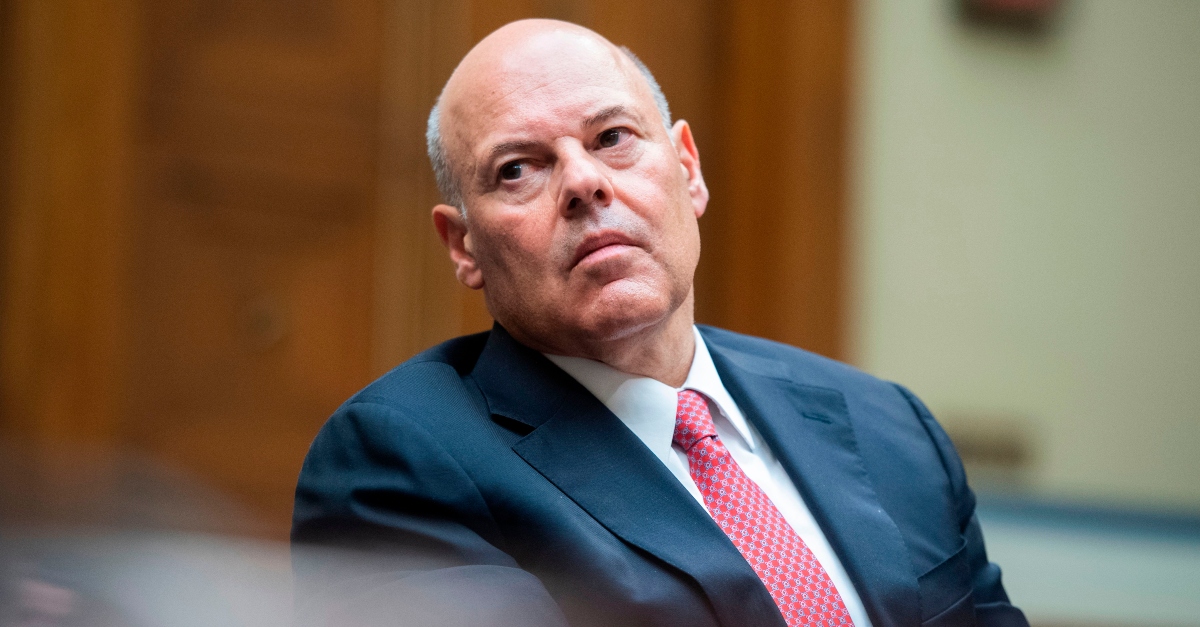
Postmaster General Louis DeJoy
Federal authorities are investigating whether Postmaster General Louis DeJoy pressured his former employees to donate to Republican political candidates and causes before reimbursing them later through excessive bonuses, The Washington Post reported Thursday.
According to the report, “people familiar with the matter” told the Post that federal prosecutors had issued a subpoena to DeJoy for information and said FBI agents had been interviewing current and former employees of DeJoy’s former company, the North Carolina-based contract logistics handler New Breed Logistics.
DeJoy’s spokesman confirmed the investigation, the Post reported.
The Post in September 2020 reported that five of DeJoy’s former employees claimed they were urged by him or one of his chief executives to make large monetary contributions to Republican fundraising efforts and to attend GOP events where tickets “routinely fetched $100,000 or more apiece.”
Two former New Breed Logistics employees also reportedly alleged that DeJoy offset the cost of the contributions by instructing the company to reimburse the employees for their political contributions by awarding them with excessive bonus payments.
“He asked employees for money. We gave him the money, and then he reciprocated by giving us big bonuses,” New Breed’s former director of human resources David Young told The Post. “When we got our bonuses, let’s just say they were bigger, they exceeded expectations — and that covered the tax and everything else.”
The allegations, if true, would appear to constitute a classic straw donor scheme often used to bypass restrictions on an individual’s political donations.
According to a Federal Election Commission (FEC) explainer:
Contributions in the Name of Another are Strictly Prohibited
Reimbursing someone for a contribution or otherwise contributing in the name of another person can result in substantial civil penalties and jail time. The FEC and the Department of Justice have prosecuted several such cases over the last few years. These violations sometimes occur when an individual who has already contributed up to the limit to a campaign gives money to another person to make a contribution to the same candidate.
Mark Corallo, a spokesperson for the embattled postmaster general, confirmed the investigation but told the Post that DeJoy never “knowingly” broke the law.
“Mr. DeJoy has learned that the Department of Justice is investigating campaign contributions made by employees who worked for him when he was in the private sector,” Corallo told the paper. “He has always been scrupulous in his adherence to the campaign contribution laws and has never knowingly violated them.”
The Post’s original reporting on the alleged scheme—which came amid allegations that DeJoy, was intentionally sabotaging the U.S. Postal Service (USPS) ahead of the presidential election—sparked an investigation by Democrats on the House Oversight Committee, many of whom accused DeJoy of lying during sworn congressional testimony.
Testifying before the Committee in August 2020, DeJoy explicitly denied having participated in any kind of straw donor scheme, calling any such claim “outrageous.”
“The answer is no,” DeJoy said when asked about the allegations by Rep. Jim Cooper (D-Tenn.). “I’m fully aware of legal campaign contributions, and I resent the assertion, sir.”
DeJoy has similarly denied allegations that he was sabotaging USPS, though a Washington state federal judge in September 2020 issued an injunction blocking his proposed sweeping changes to the agency. In blocking the changes, Chief U.S. District Judge Stanley A. Bastian, a Barack Obama appointee, said that then-President Donald Trump and DeJoy were “involved in a politically motivated attack on the efficiency of the Postal Service.”
[image via via TOM WILLIAMS_POOL_AFP via Getty Images]